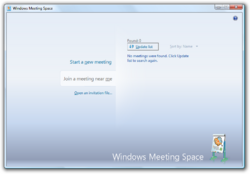Windows Meeting Space
| Component of Microsoft Windows | |
 Windows Meeting Space in Windows Vista | |
| Introduced in | Windows Vista |
|---|---|
| Replaces | |
| Windows NetMeeting | |
Windows Meeting Space (codenamed Windows Collaboration) is a discontinued peer-to-peer collaboration program developed by Microsoft for Windows Vista as a replacement for Windows NetMeeting and it enables application sharing, collaborative editing, desktop sharing, file sharing, projecting, and simple text-based or ink-based instant messaging across up to 10 users connected to the same network or across the Internet.
Windows Meeting Space has the ability to automatically set up an ad hoc wireless network if a connection to a network or the Internet are not available and also enables participants to invite other people to meeting sessions. It also requires IPv6 support since it was built on Vista's peer-to-peer framework.
The program was discontinued with the release of Windows 7. It was removed in build 6780. Microsoft recommended Microsoft Office Live Meeting as a replacement which itself was discontinued in December 2017.
Overview[edit | edit source]
When starting a session, a workspace, which contains a presentation area, is displayed. A list of notes is also shown. A list of users in the local subnet, with whom a collaboration session can be started, are automatically detected by using the People Near Me functionality, based on WS-Discovery in the peer-to-peer networking implementation in Windows Vista. Users outside the local subnet must be sent an e-mail or file invitation to participate. Applications can be shared in the session, which will be local to that session only. When an application is shared, Windows Meeting Space switches into presentation mode so that participants can see what the presenter is working on and collaboratively edit or review the shared application instance.











